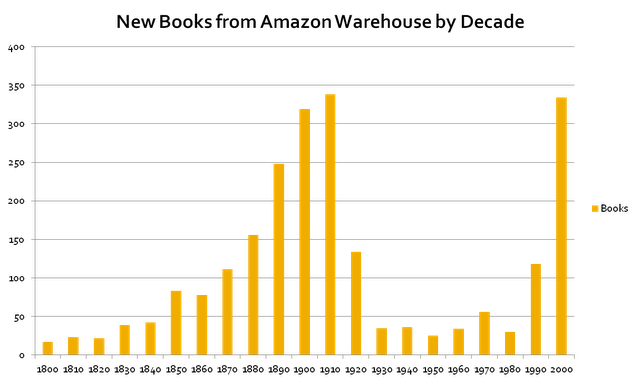This is amazing, and sad and tragic. This is a little recap by Brian Doherty on Reason’s Hit & Run. (One wonders how the heroic Doherty still waffles on IP despite all this.)
How Copyright Seems to Keep Books Unavailable and Unexploited: A Graph
Brian Doherty | March 30, 2012
Via the “Offsetting Behavior” blog from Eric Crampton:

Crampton explains:
Recall that books published through 1922 are in the public domain in the US; those published since then are covered by copyright…..
So any arguments about underexploitation of unprotected works seem untenable.
If this were a moving wall, maybe it wouldn’t be so bad: eventually, books would come out of copyright and be released in new editions. But Disney does keep going back and insisting that nothing can ever be returned to the Commons from which they so liberally drew, and Congress loves Disney; we might reasonably expect another copyright term extension act to keep the wall fairly rigid.
I do not, by the way, blog this as a confirmed anti-IP libertarian, but as data about how copyright contributes to the actual access to and use of old books, I found it interesting.
Jesse Walker wrote on how IP enforcement can hobble cultural production in his March 2000 Reason classic “Copy Catfight.”




The pro-IP people don’t care about sales, only an artistic elite’s supposed entitlement to a percentage of the profit.
Certain groups of people, like artists, are supposedly entitled to some “special” place in society which allows them to be above the law and have more “rights” to the detriment of every other profession in the world.
Similar to how the pre-Romney Republican Party was against socialist national health care – except for veterans, of course.
If I buy or build an automobile, and I allow other people to see it, it remains my automobile and I can restrict others’ use of it.
But without some form of IP, if I draw a cartoon, the minute someone else sees it, it ceases to be my cartoon and becomes everyone’s. Including Disney’s.
This is how the anti-IP argment de-values artistic and other creative works, and de-values intellectual labor as opposed to physical labor.
Yes, and if somebody sees your dancing moves or your opening lines with a girl and starts to use it, is it a theft? Maybe it should be forbidden?
You must log in to post a comment. Log in now.